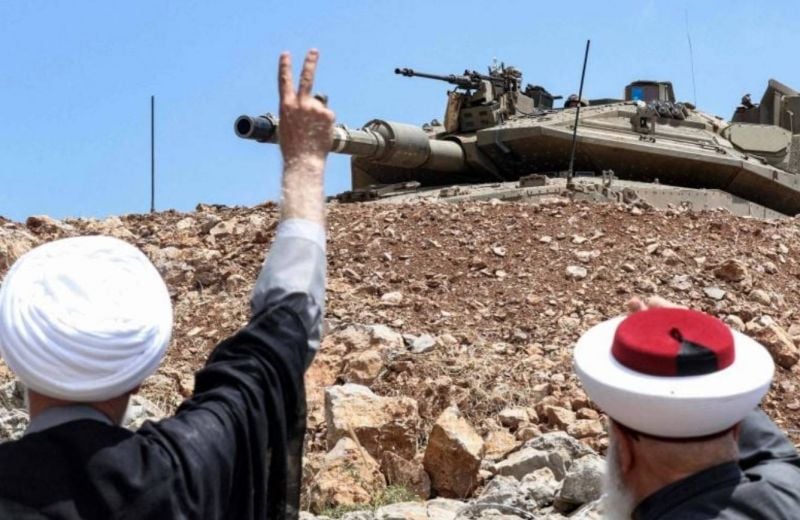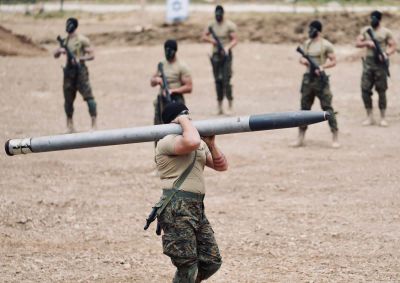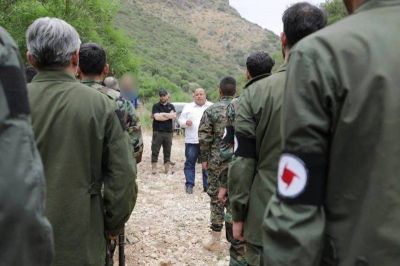
Two Lebanese sheikhs, one Sunni (right) and the other Shia (left), in front of an Israeli Merkava tank stationed on the Lebanon border last June. (Credit: Mahmoud Zayat/AFP)
The detente in the Middle East, initiated by the Saudi-Iran agreement, does not seem to involve the border between Lebanon and Israel, where the status quo is increasingly being called into question.
Over the weekend, Israel absorbed the Lebanese part Ghajar, a town on the border between Lebanon and the Syrian Golan Heights. Occupied by Israel, this Alawite village, through which the Blue Line crosses, was completely cut off from Lebanon after the Israeli army constructed a fence to the north of the village.
This violated Resolution no. 1701 and evoked general indifference. The event could hardly be separated from the two tents that Hezbollah set up in the disputed area of the Kfar Shuba hills and the Shebaa farms.
Amid the tension between the two parties, the risk escalation cannot be ruled out.
The “resistance”
“The developments at Shebaa and Ghajar are linked,” said Joe Macaron, a Middle East analyst. According to Macaron, the Israelis called into question the demarcation of the land border in order to put pressure on Hezbollah. And for good reason. With its “advanced military” outposts in the disputed Shebaa Farms, Hezbollah sent an important strategic message, that it is still a “resistance” party.
The area is extremely symbolic, since it theoretically enables Hezbollah to maintain a certain level of legitimacy for its arsenal. Although the territory occupied by Israel is considered Syrian by the International community, it is claimed by Lebanon.
Hezbollah insists to this day, 23 years after the Israeli withdrawal from the South, that as long as a piece of Lebanese territory remains under occupation, it cannot lay down its arms.
This act of provocation, which took place despite the signing of the maritime border demarcation agreement between Lebanon and Israel in October 2022, is not unique.
Hezbollah has not yet extracted benefits from the concessions it made as part of the maritime negotiations.
The Lebanese-Israeli border has experienced several episodes of tension in recent months. Starting with rockets fired from southern Lebanon towards Israel in April, followed by a full-scale military exercise in May and demonstrations by residents in the border village of Kfar Shuba in June. Which brings us to the latest incident: last week, Hezbollah fighters shot down an Israeli drone, prompting Israel to focus its tanks on the border.
Israel has also resorted to provocation. Last Sunday, coinciding with the developments in Ghajar, Israeli army bulldozers violated the technical fence and the blue line at Houla, while its soldiers fired bullets and sonic bombs. Psychological warfare is also in full swing.
The Israeli and pan-Arab press reported earlier this week that Hezbollah removed one of its military outposts in Kfar Shuba following pressure from the international community.
The United Nations Interim Force in Lebanon (UNIFIL) was unable to verify the leaks since the location of the tents could not be seen from the positions of the peacekeepers placed in Lebanon.
Mohammad Afif Naboulsi, spokesman for Hezbollah, denied this when contacted. “The outposts are still where they should be and we even intend to increase their number as per the resistance’s needs,” he told L’Orient-Le Jour.
‘Crucial test’
“Since last year, Hezbollah’s policy on the southern border has become more peremptory,” said Nicholas Blanford, a researcher at the Atlantic Council.
“I believe that the group wants to push even further, particularly in view of what is currently happening in the region,” he added.
On the one hand, Israel is displaying unprecedented violence towards the Palestinians as part of the anti-terrorism operation which has been in force since Monday in the West Bank town of Jenin. The raid resulted in the deaths of over ten civilians and has been condemned by the international community.
On the other hand, Israel is stepping up its attacks in Syria against targets belonging to Iran and its allies. The most recent of these was the strike on the city of Homs on Saturday night, which is believed to have killed Hassan Suhani, an influential officer in the Iranian Revolutionary Guard responsible for manufacturing drones.
This escalation comes at a time when Hezbollah has already established the equation of “unifying the fronts” between all the players of “the resistance axis,” from the Pasdaran (Iran’s Islamic Revolutionary Guards) to the Palestinian factions.
“In this context, the diplomatic pressure exerted by the international community on Hassan Nasrallah’s party may not bear fruit,” Blanford said. “It could lead to a clash.”
This view is shared by Macaron. “Even if, essentially, Israel and Hezbollah are able to contain the situation for the time being, we are now witnessing a crucial test for the status quo on the border,” he said.
The risk of unrest cannot therefore be completely ruled out. “If a confrontation takes place, it will surely be contained as far as possible, as neither side has any interest in provoking a major war,” added Blanford. This is particularly true since in the current climate of detente, Iran might lack the appetite for a major regional confrontation.
These developments come as the end of UNIFIL’s mandate approaches, which is due to be renewed by a vote in the UN Security Council in August.
Lebanon is trying to remove from the resolution’s text a clause introduced last year that could allow peacekeepers to patrol without obtaining prior authorization from the Lebanese army. Meanwhile, Israel and the United States want to strengthen the prerogatives and autonomy of the UN Blue Helmets.
In this tug of war, anything is fair fame, including — and in particular — the bluffing.
This article was originally published in French in L'Orient-Le Jour. Translation by Joelle El Khoury.

